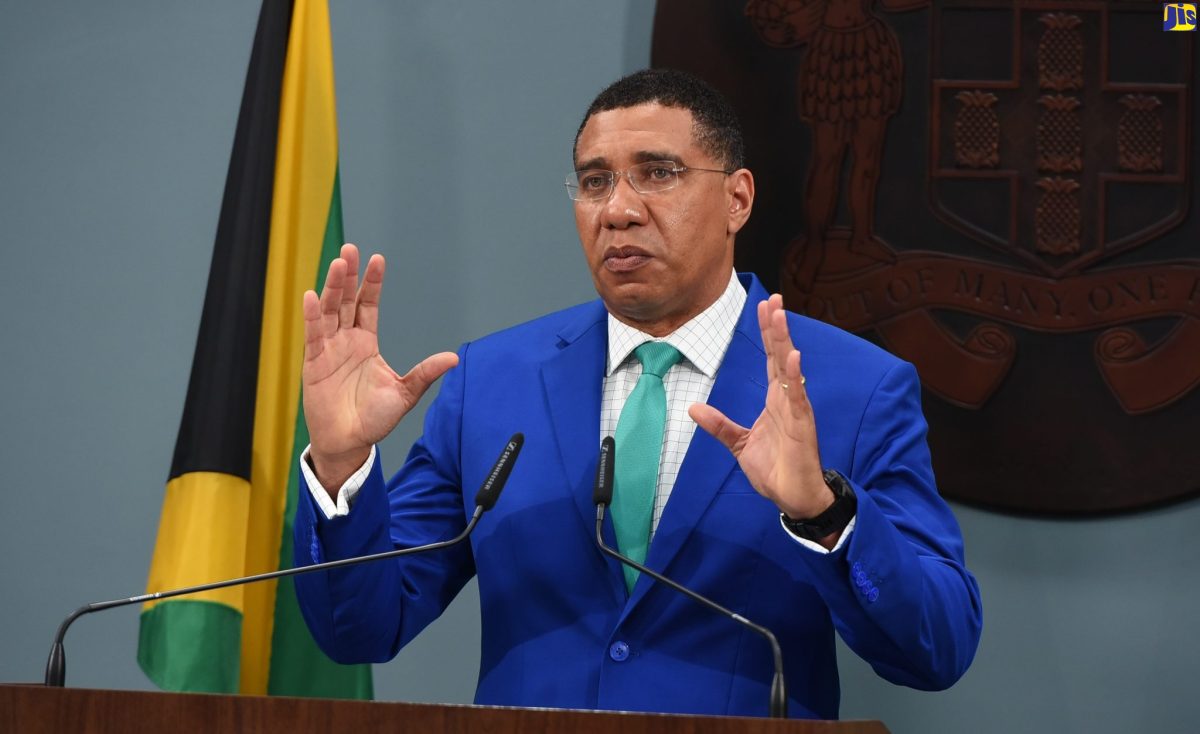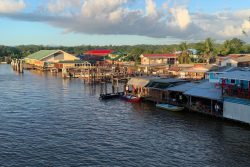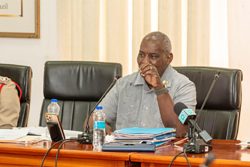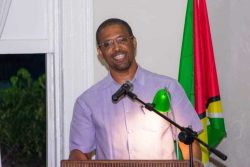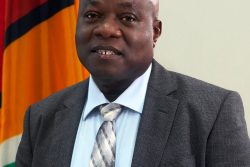… but grants Holness right to challenge reports
(Jamaica Gleaner) Prime Minister Andrew Holness has lost his bid to force the Integrity Commission (IC) to certify his 2022 and 2023 statutory declarations, but has been given the go-ahead to seek the court’s authority in getting the IC’s investigative report and special report invalidated.
Justice Althea Jarrett yesterday granted the prime minister and his three companies – Imperium Investments Holdings Limited (IIHL), Positive Media Solutions Limited (PMSL), and Positive Jamaica Foundation Limited (PJFL) – permission for a judicial review claim against the respondents – the director of investigation Kevon Stephenson and the Integrity Commission itself.
The commission’s director of information and complaints (DIC), Craig Beresford, was initially a respondent. However, the judge found that he had already fulfilled his duties and “it would be an exercise in futility to order the DIC to do what, on his unchallenged evidence, he has already done”.
A judicial review allows the court to scrutinise processes used by a public authority to make decisions to determine whether they were fair and the decision is legal.
On September 17, the Integrity Commission tabled a report in Parliament that raised concerns about Holness’ statutory declarations. In the controversial 171-page report, the commission’s director of investigation said he could not conclude on the question of illicit enrichment, highlighted unexplained financial discrepancies in Holness’ 2021 income filings, and raised questions about tax compliance and transactions of over $470 million involving connected companies.
The commission, which said it could not certify the income declaration, referred the matter to the Financial Investigations Division (FID) in a special report, citing Holness’ failure to provide expense details.
However, Holness has denied any wrongdoing, claiming that the report is flawed and unfairly suggests unethical and criminal conduct by him and affiliated companies.
On September 30, the prime minister applied to the Supreme Court for 21 orders or declarations, including the judicial review.
And, consequently, initiated judicial review proceedings to get the court to terminate all investigations into his financial affairs, invalidate the report, strike down certain provisions of the Integrity Commission Act, and sections of the Corruption Prevention Act used to probe illicit enrichment as “unconstitutional”.
Holness’ legal team, however, decided to forgo the orders for declarations, including those which challenged aspects of the Integrity Commission Act, the Corruption Prevention Act as well as others declaring that the submission of the reports to Parliament was unlawful and or illegal, that Holness’ right to fair procedure or natural justice at common law was breached and that the IC acted illegal in referring the prime minister for investigation.
‘ADVERSE EFFECT ON PM’S RIGHTS’
Holness is seeking two orders of certiorari to quash both the August 30 investigation report and the September 5 special report, save for the paragraphs which stated that “The Commission is also respectfully urging the Parliament to develop a policy, and legislation, if thought necessary, to deal with the commercial and corporate activities of – 53 – Ministers of Government and the likelihood of conflicts of interest arising therefrom”.
The judge, in granting leave pertaining to the orders for certiorari yesterday in the Supreme Court, accepted the IC’s non-objections while agreeing that the threshold for leave to bring the claim was met. Similarly, she said the threshold for the special report was also satisfied.
“I find that it has a practical adverse effect on the PM’s rights, in that in accepting the DI’s referral recommendation and urging Parliament to also accept it, as there will be no finality in the matter until the FID completes its work, the PM’s statutory declarations for 2021, 2022, and 2023 will not be finalised until the FID conducts and completes its own investigation,” Justice Jarett said.
She, however, refused the orders of mandamus compelling Beresford to examine the 2022 and 2023 statutory declarations and also for the two executives to comply with sections 32 and 42(1) of the Integrity Commission Act.
A similar order demanding that Stephenson recommend to the IC that Holness be exonerated of culpability in relation to the 2021 and 2022 statutory declarations as the IC deemed fit was also refused.
An order of mandamus compels a public body or public officer to perform a statutory duty.
“I find that none of them can lie. The DIC’s unchallenged evidence is that he has examined the PM’s statutory declarations for 2021, 2022 and 2023. The court does not act in vain and therefore will not direct the DIC to do that which he has already done,” she said.
“I find that the DIC has performed the duties imposed on him by sections 32 and 42(1) of the ICA [Integrity Commission Act].”
As to the orders seeking mandamus for the Integrity Commission to perform its duties under sections 32 and 42(1) of the ICA, she said there are no duties that the IC is required to perform under any of these two provisions.
Justice Jarrett further emphasised in her written judgment that “The court cannot and will not usurp the decision-making powers of public bodies and public officers, and therefore the order of mandamus compelling the DI to recommend to the IC that the PM be exonerated of culpability in relation to the 2021 and 2022 statutory declarations cannot lie.”
INTEGRITY COMMISSION SUBMISSIONS
The IC’s lawyers “have indicated in their written submissions that while they do not consider that the proposed claim will likely succeed, the only orders sought in the application, which they oppose, are the orders of certiorari in respect to the IC, all the orders for mandamus, the declaratory remedies, and the orders seeking damages and cost”.
They specifically opposed the certiorari order with respect to the special report
Holness and his team maintained that the IC’s report was an abuse of the IC’s powers, while contending that an aspect of the report which states that “… there can be no finality in the matter until the FID has completed its work”, was ultra vires, and illegal.
Holness further contended that the statement that there can be no: “certification of a statutory declaration until the 1st Respondent is satisfied that the statutory declaration has been duly completed”, presumes that Stephenson’ satisfaction is based on the work of the FID, and that there was no statutory basis for this.
However, lead attorney for the IC, Michael Hylton KC, argued that all the IC did in its special report was to “urge Parliament to support the referral, as there can be no finality until the FID completes its work; remind Parliament that in keeping with the provisions of the ICA, there can be no certification until Stephenson is satisfied that the statutory declaration has been duly completed and once he is so satisfied, he will inform the IC; and proposed that a policy or legislative framework be created to govern ministers’ commercial and corporate activities”.
Hylton submitted that there was nothing in the special report which affected Holness’ rights and that the investigation report and the special report were not linked.
Ransford Braham, KC, argued for Holness and his companies that the two reports were inextricably linked and so the IC’s non-objection to leave being granted in relation to the investigation report should be the same for the special report. He also argued that the IC was wrong in law to take the view that there can be no finality until the FID has completed its work.
He said that it is for the director of the investigation to utilise the provisions of the Integrity Commission Acts which includes sections 43(1)(b) and 43(2), which allow him to act in the face of a recalcitrant declarant.
‘UNDOUBTEDLY CONNECTED’
Justice Jarrett, however, said, “I’m of the settled view that although the August 30, 2024, report and the special report are two separate reports, they are undoubtedly connected. Any other interpretation would, in my judgment, be artificial and too narrow.”
She added, “There is significant force in Mr Braham’s submission, that to concede that the August 30, 2024, report is reviewable must lead to a concession that the special report is also reviewable.”
In respect to the declarations pertaining to the constitutional breaches, breaches of natural justice and procedural fairness as well as irrationality and unreasonableness in the findings, conclusions and recommendations, the judge said permission is not required to seek public declarations.
Holness’ legal team, who welcomed yesterday’s ruling, said that the 23 declarations for relief will be included in the claim which will be heard in January.
Hylton, for his part, said, “The court ruling was largely consistent with the submission made on behalf of the commission and its directors.”
